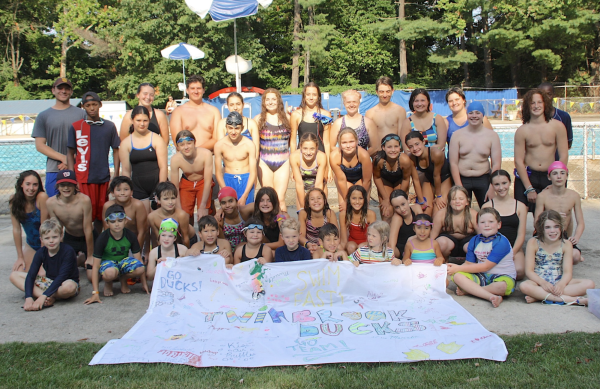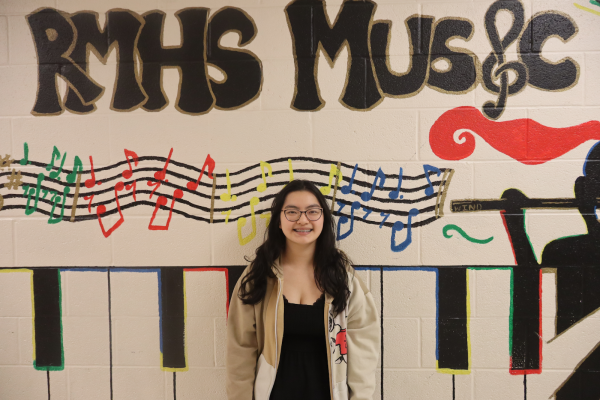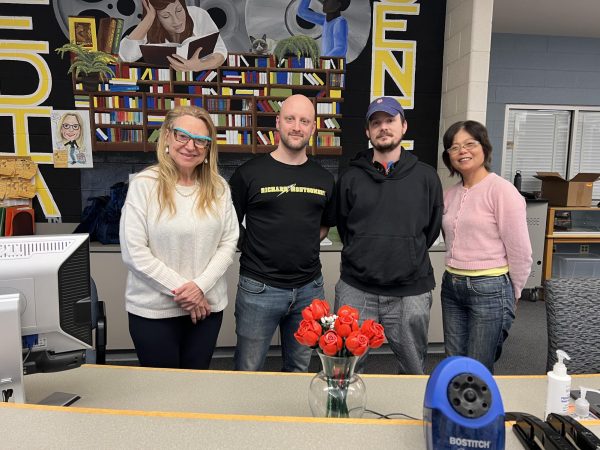Monteleone shares his experience at Tilden Middle School
From January to Febraury, principal Damon Monteleone visited Tilden Middle School in Rockville, MD as part of the Montgomery County Principal Intern Program.
Q: So, why were you at Tilden Middle School the last month or so?
A: So, it was as part of the Montgomery County Principal Intern Program. So, when a school gets an intern, like we had Ms. Butler this year, Ms. Butler then takes over the building as principal for two months. When she does, the principal leaves the building while the intern takes over so as to give them complete freedom and autonomy around the school. To allow the intern to work in a liberated way, the basically play a “musical chairs” game with the principals. So, every school which has an intern then receives a visiting principal. So for example, while I was away, we had Mrs. Elise Burgess come—and she is the principal of Sally K. Ride Elementary School. So that’s why I was Tilden. When a visiting principal goes to a new school, they assume the role of an assistant principal. So, I spent a lot of my time consulting with the intern, giving him a different perspective on decisions he should make or processes he should follow.
Q: So what was your first impression of the students and the staff at Tilden?
A: Small…and slow…and low stress. They have about 900 kids, and the building is very small. There is a much smaller staff, probably less than half the size of our staff. It’s just slower because I’m working in a middle school in an affluent area where students don’t have a lot of social, emotional, or financial needs. So we get a lot of students who are coming to school with kind of an academic mindset, and who don’t have a lot of stressful things in their lives outside of school. I probably went from being one of the most overworked principals in the school system, sitting on top of an enormous and very complex building of RM, to being one of the most overpaid principals in the school system when I went to Tilden.
Q: It was like a breather?
A: It was ABSOLUTELY a breather. It was phenomenal. I needed it, I called it the “Tilden Country Club.” I mean I was getting paid to breathe their air and to just kind of help people. An average day for me at RM is probably 7 a.m. till 6 p.m., probably 11 hours on average, and that does not count the night events, that does not count Mr. RM, or drama, or band, or sports, or whatever else. So, I went from 11 hour days at a minimum to getting to school at around 8 a.m. and leaving by 4 p.m.
Q: Were the middle school students more interactive and gregarious in middle school?
A: I think they were absolutely interactive, they were curious. They all come up to you, and I was the 6th grade administrator, so that was my grade. I dealt with 6th grade discipline, 6th grade parent meetings, and 6th grade lunch duty. So they’re still 11 years old, right? They’re still pretty young. The 8th graders, they treated me differently. They were like “oh, who’s that new guy?” The 6th graders, they called me Iron Man and Mr. Stark, and we would joke about the next Iron Man suit I was going to build. They would pretend that they were the Black Panther. They’re still little kids, so it was really fun.
Manning my post during 6th grade lunch duty. “You won’t get a ticket to go outside for recess until your table is clean…” ? pic.twitter.com/7pRiwLraiT
— Damon Monteleone (@RMHS_Principal) January 3, 2019
Q: So were there any similarities you noticed between the behavior and overall demeanor between high school students at RM and kids at Tilden?
A: You can kind of see at that age, who they’ll become. You definitely see the kids that will be all in the play, you definitely see the kids that will be in the band, you definitely see the kids that want to play sports, or on the debate team, or the robotics club… they’re all there. You can just see who they may become or what their interests will be in high school. Some of the 8th graders seem like they could be 10th graders here… they’re really tall, and they just look older. That’s the thing about middle school too, you have kids that are 4 foot 3 and 60 pounds, and then you have some kids who are 6 foot 2 and 180 pounds. You have this huge range of social maturity, emotional maturity and size.
Q: How was the staff at Tilden?
A: They were very open about asking me for support. I would go in, I did a lot of informal observations, and gave informal feedback on their teaching. I helped them with certain “Special Ed” situations or providing accommodations, or they have an LFI program, which is “Learning for Independence,” they have a special program for students with severe cognitive disabilities. Kids with Down Syndrome, for example, so that was a new experience for me, and I provided a lot of support in that area because there’s a range of behaviors that are occurring in those classes.
Q: Do you believe that you had a lot of influence during your time at Tilden? Especially with the 6th graders?
A: I think that there were probably 10 or 12 of them that I got to know really well. And I hope that I made some sort of positive impact. There were a few that kind of clung to me, and there were a few that kept popping up on my radar for little silly ticky-tacky things, like throwing snowballs, knocking each other’s hats off, flicking each other on the ears—they had all these games that they would play—knocking the notebooks out of their hands. Especially the boys, they were constantly doing these kinds of silly things, so I had to deal with a lot of that.
Q: What was your most memorable interaction or experience at Tilden?
A: I think it was probably working with one student in particular. In addition to their LFI program with kids with Down Syndrome and cognitive disabilities, they also have an autism program. There was a student named Akinawe who I worked with closely. He really took a liking to me, and he always wanted to engage in conversation and be social, and speak to me about things. He was very smart and had all kinds of information just this kind of esoteric information, and he had a non-sequitur way of looking at things. He kind of inspired me and gave me a grounding as to why we are in education, and it kind of refocused my purpose a little bit.
Q: Was there anything you missed about RM?
A: So I didn’t miss the hours, I didn’t miss the stress… but I’m not a middle school person, right? This is an amazing school with amazing staff and students, and I’ve always known I’m one of the luckiest principals in the country. But it’s true, absence and distance makes the heart grow fonder. I think absence and distance crystallizes perspective and allows the clouds to part, so to speak, so you can see things as they are. You see things without stress or emotion or other things that may cloud perception. I missed all of it. All of it. I missed the kids, I missed being in the hallways.
Q: Would you like to repeat this experience once more in the future? Maybe in elementary school or another middle school?
A: I actually wanted to go to elementary school, they sent me to a middle school instead. But, I would love to go to an elementary school. I’m not sure I want to repeat the intern experience. I love Ms. Butler, but it’s about me leaving the school. It was very hard to leave, that’s all.
My new favorite poster at Tilden Middle School. @TildenAP @LearGraham pic.twitter.com/XbA01ce0jQ
— Damon Monteleone (@RMHS_Principal) January 23, 2019
Q: Yeah, that’s true. How would you say the experience helped you grow as a principal?
A: Well, I think I learned a lot. Who I need to be and who I should be if I’m going to be able to sustain my passion and energy for this job. I learned about limits, I learned about not internalizing everything, and not feeling the weight of the world or this school on my shoulders at all times, because when you step away from something for two months and somebody else is able to do it, everybody is replaceable. So, the world is not revolving around Richard Montgomery, the world will continue to spin, and I need to take a much more balanced approach to this job and my life.
Q: Is there anything that RM students can learn from middle school students or vice versa?
A: Be nice. Be nice to each other.
Your donation will support the student journalists of The Tide, Richard Montgomery High School's student newspaper. Your contribution will allow us to purchase equipment and cover our annual website hosting costs.
Meghna is a staff writer for the Tide, and she is currently a part of the TidePod. Meghna really enjoys reading and writing about current events, including...









